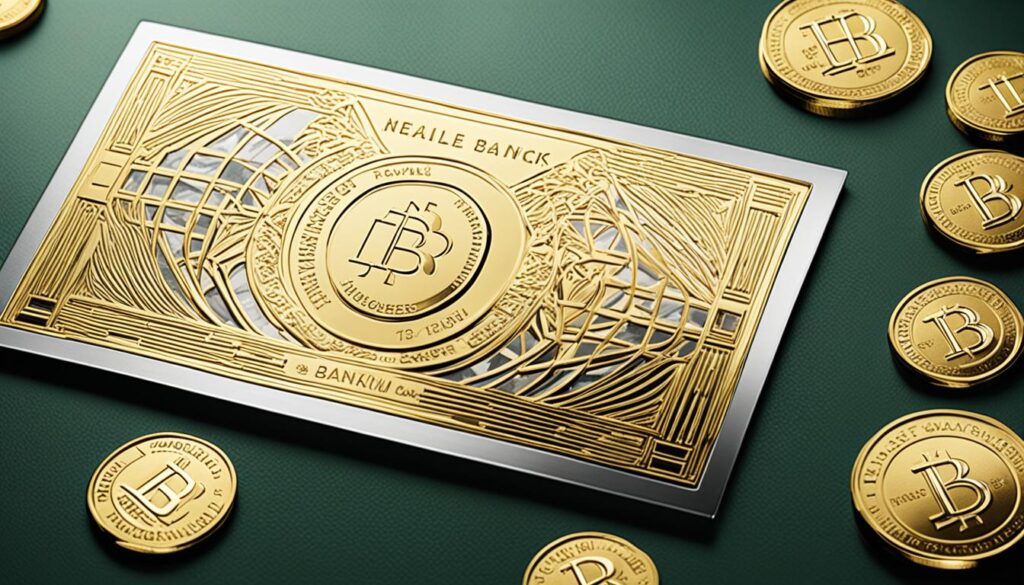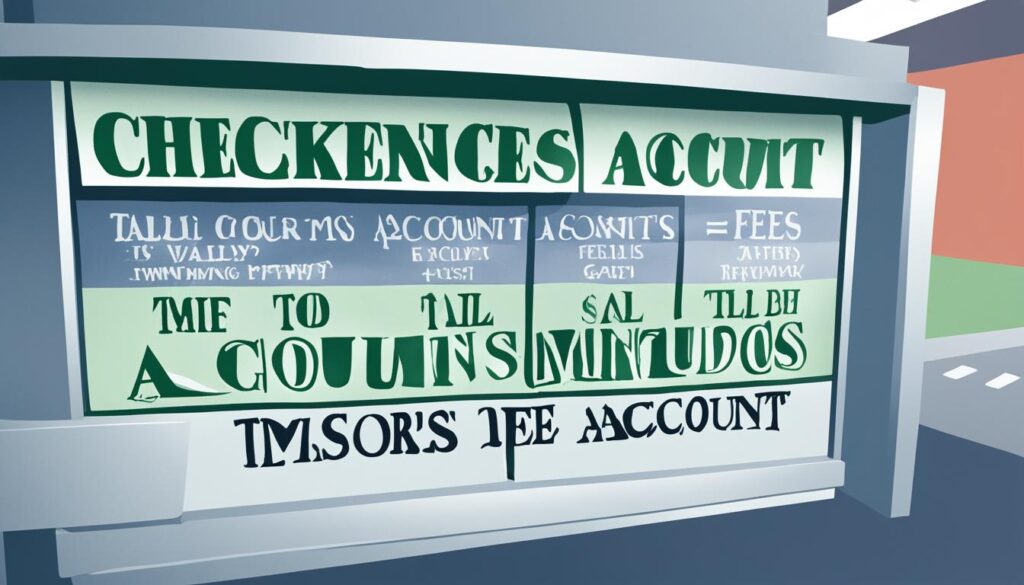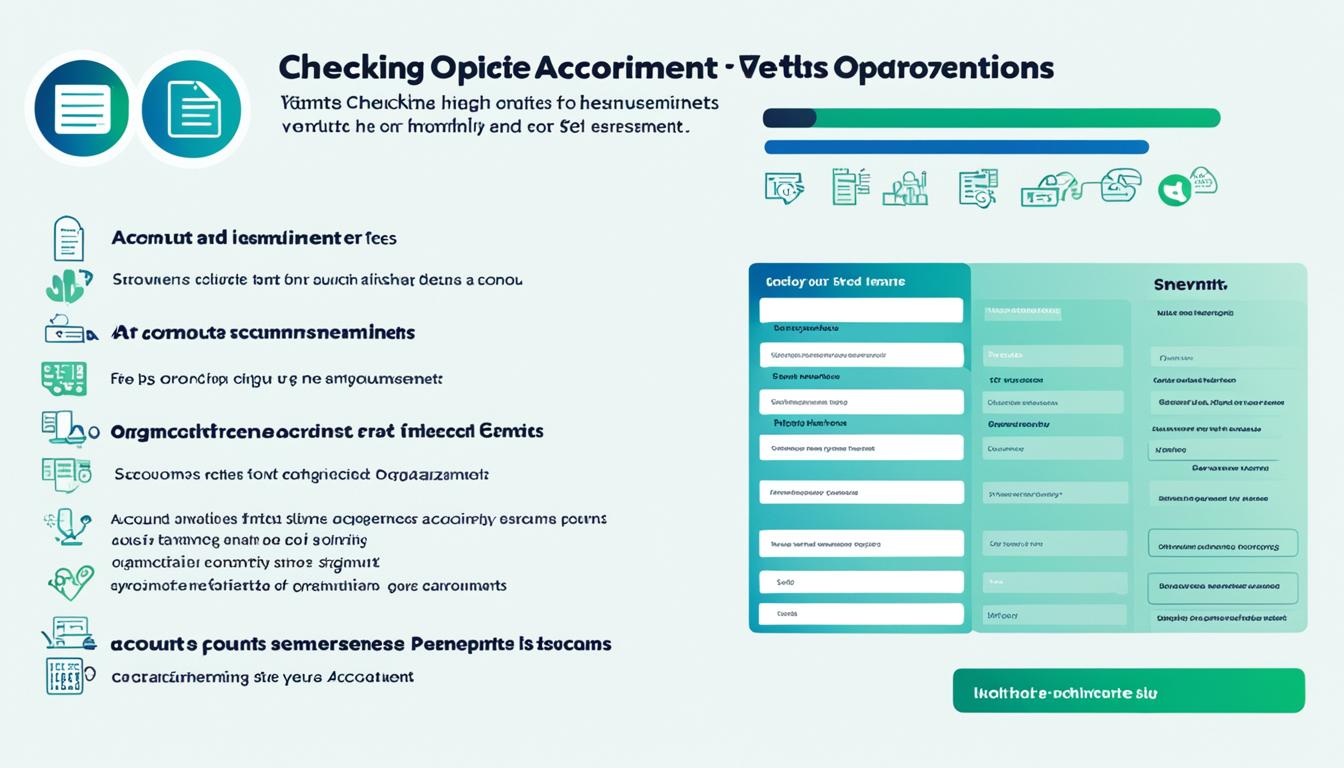Finding the right checking account can change how you manage money. This guide will walk you through the basics and show you the best options for your needs. Whether you want to save more, earn interest, or get special perks, we’ve got you covered. Let’s help you make a smart choice and take charge of your banking experience.
Key Takeaways
- Discover checking accounts that offer 1% cash back on up to $3,000 in debit card purchases each month1
- Learn about early pay services that allow you to receive your paycheck up to two days early with direct deposit1
- Explore no-fee ATM access at over 60,000 locations nationwide1
- Discover overdraft protection and money transfer features like Zelle®1
- Understand the importance of digital banking tools and mobile app features1
Checking Accounts: Your Gateway to Convenient Banking
A checking account lets you easily handle your daily money matters. It gives you access to your cash through a debit card, online bill payments, and ATM withdrawals2. These accounts are perfect for short-term needs and everyday costs, making them key for managing your money.
What is a Checking Account?
A checking account helps you deposit, withdraw, and transfer money as you need. It’s the center for your daily financial tasks, like getting paychecks, paying bills, and buying things3. Banks and credit unions offer these accounts, and they’re insured up to $250,000 per depositor.
How Does a Checking Account Work?
Opening a checking account gives you a debit card, checks, and online/mobile banking access2. You can put money in, take cash out at ATMs, buy things, and pay bills online23. Checking accounts also have features like overdraft protection, mobile check deposit, and automatic bill pay to make managing money easier3.
“Checking accounts are the foundation of personal finance, providing a secure and accessible way to manage your day-to-day financial needs.”
No-Fee Checking Accounts: Maximize Your Savings
Choosing the right checking account is key. High fees can quickly drain your savings. So, finding a no-fee checking account is crucial to save more4.
Benefits of a No-Fee Checking Account
- No monthly maintenance fees: Say goodbye to monthly fees just to keep your account open.
- Reduced overdraft fees: These accounts often have lower or no overdraft fees, keeping your money safe.
- Free ATM access: You can use a wide network of ATMs without extra fees.
- Potential for cash back or interest: Some accounts offer cash back on debit card purchases or interest on your balance4.
With a no-fee checking account, you keep more money in your pocket. This lets you save more or reach your financial goals faster5.
“Choosing a no-fee checking account is a smart way to maximize your savings and avoid unnecessary charges that can quickly add up. By eliminating common fees, you can keep more of your money and focus on achieving your financial goals.”
If you’re opening your first checking account or thinking of switching, check out no-fee checking options. It could change your financial life5.
Interest-Bearing Checking Accounts: Earn While You Spend
Traditional checking accounts usually don’t earn interest. But now, there are options that let you grow your money while keeping it easily accessible. These accounts offer a good annual percentage yield (APY) on your balance. This means you can earn money on your cash6.
| Account Name | APY | Minimum Deposit |
|---|---|---|
| Presidential Bank’s Advantage Checking | Up to 4.62% | $500 |
| Axos Bank’s Rewards Checking | Up to 3.30% | $50 |
| Lake Michigan Credit Union’s Max Checking | 3.00% | None |
| Heritage Bank’s eCentive Checking | 2.02% | $100 |
| Quontic Bank’s High-Interest Checking | Up to 1.10% | $100 |
Premium Checking Accounts: Elevated Banking Experience
Exclusive Perks and Privileges

“Premium checking accounts offer an elevated banking experience, with exclusive perks and privileges that cater to the needs of discerning customers.”
Online Banking: The Convenient Future of Checking Accounts
The digital revolution has changed how we handle our money. Online banking and mobile banking are now the top choices for all ages11. They make managing our finances easy and accessible.
Advantages of Online Checking Accounts
Despite these issues, online banking is shaping the future of checking accounts. As technology advances, we’ll see more cool features and services for our digital banking needs11.
| Key Findings | Details |
|---|---|
| Digital Banking Adoption | Digital banking is the preferred method of banking across all generations11. |
| Interest Rates and Fees | Digital-only banks typically have lower overhead costs, allowing them to offer competitive interest rates on checking account balances and higher yields on savings accounts11. |
| Personalized Service | Digital-only banks may not provide the same level of personalized service or relationship banking experiences as traditional brick-and-mortar banks11. |
| Deposit and Withdrawal Access | Digital-only checking accounts may present challenges for individuals who frequently deposit or withdraw cash, as some online banks may have limited ATM access11. |
| Technological Risks | Digital-only checking accounts rely on technology for account management, introducing the risk of technical glitches, system outages, or cybersecurity threats11. |
“The digital revolution has transformed the way we manage our finances, and checking accounts are no exception.”
Checking Accounts for Students and Seniors
Banking needs change with age. That’s why banks offer special checking accounts for students and seniors. Student checking accounts have low or no fees. Senior checking accounts offer perks like waived fees and early CD withdrawals without penalties12.
| Feature | Student Checking Accounts | Senior Checking Accounts |
|---|---|---|
| Monthly Fees | Often lower or no fees | May be waived for higher balances or age 65+ |
| APY | Typically lower, but some offer rewards | May offer higher interest rates on balances |
| Age Requirements | Typically 17-24 years old | Typically 55 or 65 years and older |
| Special Features | Budgeting tools, ATM fee waivers | Wealth management services, discounted trades |
Knowing about student and senior checking accounts helps you pick the best one for you. Whether you’re starting college or enjoying retirement, there’s a checking account made for you14.
“Choosing the right checking account can make a big difference in your banking experience, especially during big life stages like college or retirement.”
Checking Account Bonuses and Promotions
Getting sign-up bonuses and using checking account promotions can boost your banking benefits. Banks offer various incentives to draw in new customers, from a few hundred dollars to more15. To make the most of these deals, knowing the requirements and deadlines is key.
How to Earn Sign-Up Bonuses
To get sign-up bonuses, you often need to meet certain conditions, like setting up direct deposit or making a certain number of debit card transactions15. Some top bonuses recently include:
- American Airlines Federal Credit Union: Up to $250 referral bonus15
- Axos Bank: $50 referral bonus and $50 for the referred customer15
- Chase Bank: Up to $500 referral bonus15
- Chime: $100 referral bonus and $100 for the referred customer15
- M&T Bank: Up to $500 referral bonus15
- TD Bank: Up to $500 referral bonus15
- Marcus by Goldman Sachs: Additional 0.25 percent promotional rate increase for three months for up to five referrals per year15
There are also business bank account bonuses available15.
Many banks have checking account promotions for both personal and business accounts15.
- Chase Bank (Private Client): Up to $3,000 bonus for meeting deposit requirements within a specified period15
- Citibank: Up to $1,500 bonus based on minimum deposit and balance maintenance15
- Huntington National Bank: Up to $600 bonus for opening specific checking accounts and making cumulative deposits within 90 days16
- BMO: Up to $500 bonus depending on the type of checking account opened and minimum direct deposits made within a specific period15
- PNC Bank: Up to $400 reward bonus for opening specific Virtual Wallet accounts and making qualifying direct deposits15
- Axos Bank: $500 bonus for new customers making direct deposits into a new Rewards Checking account15
- Wells Fargo: $300 bonus for new checking customers meeting specific criteria15
- SoFi Bank: Up to $300 bonus for opening a Checking and Savings account and meeting direct deposit requirements17
- Fifth Third Bank: $250 bonus for opening specific checking accounts and having a qualifying direct deposit within a specified period15
Remember, the conditions, requirements, and deadlines for these bonuses can change, so always check the details carefully15.
Checking Accounts: Fees and Minimums Explained
Checking accounts come with many fees and balance requirements. You’ll find monthly charges, overdraft fees, and ATM fees. It’s key to know these fees to avoid surprises and get the most from your account.
Common Checking Account Fees

Choosing the Best Checking Accounts
When picking a checking account, think about what you need and like. Look at the fees, minimum balance needs, interest rates, customer service quality, and digital features. This way, you can pick an account that fits your banking habits and financial goals.
Factors to Consider When Selecting a Checking Account
Also, consider the digital features like mobile banking apps and online bill pay. Many accounts come with easy-to-use apps and work with services like Zelle®21. These tools make banking easier and more convenient.
Don’t forget to look at the customer service of the bank. Accounts with great mobile apps and helpful customer support are better21.
By considering these factors, you can find a checking account that meets your needs.
Conclusion
Choosing the right checking account is key to reaching your financial goals. You have many options, from no-fee checking to interest-bearing and premium accounts. Pick the one that fits your banking needs and spending habits22.
Looking to save more, earn rewards, or get special perks? The checking account world has lots to offer. Think about fees, balances, and features to pick wisely. This choice will make managing your money easier and help your financial health in the long run23.
When looking at checking accounts, pay attention to details. Make sure you manage your account well to avoid credit problems like negative balances or collections. Open a new account before closing the old one and update your payments. This way, you’ll switch smoothly and keep your finances healthy22.
FAQ
What is a checking account?
A checking account lets you manage your money easily every day. You can use it for daily expenses. It comes with a debit card, online bill payments, and ATM access.
How does a checking account work?
Checking accounts are for short-term money needs and daily costs. They let you deposit, withdraw, and pay bills easily.
What are the benefits of a no-fee checking account?
No-fee checking accounts save you money by not charging for monthly fees, overdrafts, or ATM use. This means you keep more of your money.
Can I earn interest on a checking account?
Yes, some checking accounts pay interest. You can earn a good annual percentage yield (APY) on your money. But, you might need to keep a certain amount in the account.
What are the perks of a premium checking account?
Premium checking accounts offer special benefits like no ATM fees, better debit card perks, and customer support. They cost more each month but give you more value.
What are the advantages of online checking accounts?
Online and mobile banking make managing money easy with 24/7 access, mobile deposits, and online bill pay. These accounts offer a modern way to bank.
What special features do student and senior checking accounts have?
Student accounts often have low or no fees. Senior accounts might offer waived fees and special early CD withdrawals. These accounts are designed for your life stage.
How can I earn sign-up bonuses for a new checking account?
Banks offer bonuses and promotions for new checking accounts. These can be hundreds or even thousands of dollars. You usually need to set up direct deposit or use your debit card a certain number of times.
What are the common fees associated with checking accounts?
Checking accounts can have fees like monthly charges, overdraft fees, and ATM fees. Some accounts require a minimum balance to avoid fees or get perks.
What factors should I consider when choosing a checking account?
Look at fees, balance requirements, interest, customer service, and digital features like mobile banking and online bill pay when picking a checking account.
Source Links
- Free Checking Account – No Fee Cashback Debit | Discover
- 5 Reasons You Must Have a Checking Account
- 3 Reasons Why You Should Use A Checking Account
- 6 Best No-Fee Checking Accounts of August 2024
- Best No-Fee Checking Accounts Of August 2024
- What Is An Interest Checking Account?
- Best High-Yield Checking Accounts for August 2024 | Bankrate
- The top premium checking accounts offering waived fees, loan discounts, VIP event access and more
- Best Premium Checking Accounts Of August 2024
- How To Find The Best Premium Checking Accounts
- The Future of Banking: The Rise of Digital-Only Checking Accounts
- Top 10 Checking Accounts for Seniors
- Here are the best checking accounts for students with no monthly fees
- Best Student Checking Accounts Of August 2024
- Best Bank Account Bonuses For August 2024 | Bankrate
- $600—Huntington Bank Checking Account Promotions & Bonuses | Huntington Bank
- 15 Best Bank Promotions and Bonuses of August 2024 (up to $3,000) – NerdWallet
- Checking Account Fees: What They Are And How To Avoid Them | Bankrate
- 7 common fees of checking accounts and how to avoid them
- 10 Tips to Choose the Best Checking Account – Experian
- 6 tips for choosing the best checking account
- Does Closing Bank Accounts Hurt Your Credit? | Bankrate
- Does Closing a Bank Account Hurt Your Credit? – NerdWallet
